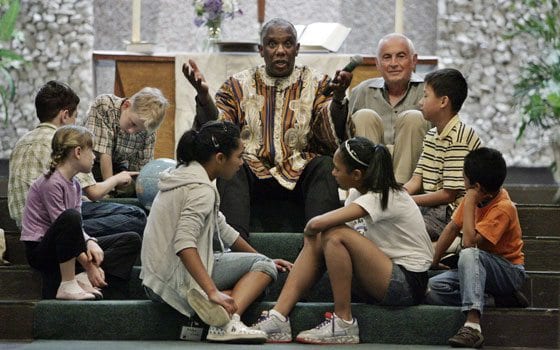
In the year since the congregation’s unanimous vote, Cribbs has made superficial changes to the weekly services. He wears a richly embroidered, multicolored African shirt on Sundays instead of his minister’s collar, hosts a Bible study group called “Soul Food” and encourages the choir to dance in the aisles and experiment with more modern-sounding, upbeat songs.
He rarely discusses his own childhood in Watts, where he was raised in one of the largest public housing developments in the nation, or the anger he felt when he was stopped by police in West Hollywood every day — for no apparent reason — as he drove to work in the late summer of 1969.
Yet congregants say their church today feels different. The open-minded spirit that was nurtured in San Marino’s pews for many decades has blossomed under Cribbs and the social activism at its core seems that much more urgent because of his presence.
“He wears being an African American man as sort of a mantle, in the sense that it frames the conversation and the understanding of what our country is, but it doesn’t dictate the only perspective,” said Carol Bennett, who joined the church six months ago.
“If you’re serious about your Christianity, you see that consistently Christ spoke up for the oppressed, the poor, the underdog,” she said. “What Art helps us do is to think through more specifically, ‘What does that mean in America?’”
Cribbs says the transition from his 250-person church in San Diego has been an easy one, but he acknowledges he has moderated what he calls his “Afro-centric” style of preaching. Now, he preaches with a quiet intensity, his voice so low at times that it barely rises above a whisper.
On a recent Sunday, Cribbs made a point about racism by dividing congregants into groups based on the month of their birth — and then lauded some months and said he despised others.
“January people, April people, July people, you know you should have done better choosing those months to come into our world,” he said. “You were never anything, you will never be anything, because you were denied at birth.”
Cribbs says preaching such sermons — and reaching out to people so different from himself — has given him a deeper understanding of his mission, a mission that goes beyond race and class to a universal truth.
“Being here with the people,” he said, “helps me to understand and feel what they are feeling and hopefully that deepens, if not my faith, then my humanity.”
(Associated Press)






